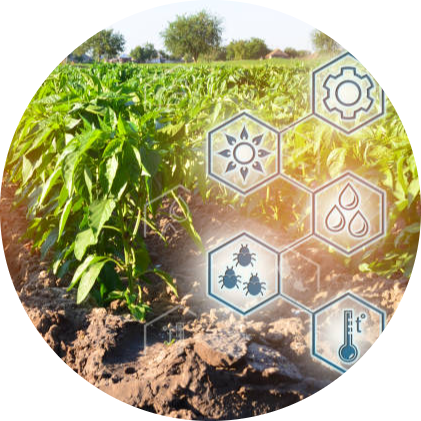Environmental Toxins and Their Impact on Neurotransmitters

Environmental toxins, such as pesticides, herbicides, air pollution, heavy metals, and chemicals commonly found in household products like cleaning agents, cosmetics, perfumes, air fresheners, personal care items, dish soap, laundry detergent, and fabric softeners, can disrupt and deplete neurotransmitters. To maintain adequate levels of GABA, it is crucial to reduce exposure to these toxins by adopting a non-toxic, environmentally friendly lifestyle, and choosing organic products.
Pesticides: Powerful Neurotoxins
Among various toxins, pesticides have a profound effect on the brain. These neurotoxic chemicals can disrupt multiple neurotransmitters, including acetylcholine, dopamine, serotonin, endorphins, oxytocin, histamine, norepinephrine, and GABA. Many pesticides primarily target GABA by inhibiting its activity, specifically designed for this purpose.
Candida and Glutamate Surges
Toxins produced by Candida can lead to surges in glutamate production. Additionally, a wide range of other toxins, including mold toxins, bacterial toxins, Lyme disease, and organic solvents, can also cause similar glutamate surges. Dr. Rick Sponaugle, a brain expert, highlights how toxins released by bacteria in the mouth causing gingivitis and periodontal disease can lead to increased glutamate activity, resulting in symptoms like anxiety.
Mycotoxins' Impact on Glutamate
Mycotoxins, toxins produced by mold and fungi, are of particular interest due to their impact on glutamate. Studies suggest that mycotoxins may significantly increase glutamate release, potentially leading to elevated glutamate levels in individuals living in mold-damaged homes or those with previous mold exposure.
GABA Supplementation: A Complex Balancing Act
GABA supplementation is often recommended to increase GABA levels and decrease glutamate. However, some individuals may experience stimulating effects from GABA supplementation, possibly increasing glutamate levels. The GABA shunt, a complex metabolic pathway responsible for GABA production and regulation, plays a critical role in this process.
Understanding the GABA Shunt
The GABA shunt involves a closed-loop process aimed at producing and preserving GABA. However, individuals with conversion issues may experience a build-up of glutamate instead of GABA. Consequently, supplementing with GABA may not be beneficial for everyone, as excess GABA can convert back to glutamate.
Leaky Brain and GABA Supplementation
Dr. Datis Kharazzian, a brain expert, uses GABA supplementation as a screening tool for identifying leaky brain conditions. GABA should not be able to cross the blood-brain barrier, but if it does, it indicates a leaky brain. Using GABA supplements, even with positive effects, may lead to the downregulation of GABA receptor sites, potentially causing withdrawal symptoms when discontinuing supplementation.
N-acetylcysteine (NAC) and Glutamate
NAC, known as a glutamate scavenger, may be suggested to increase GABA levels. However, it also increases glutathione, which can raise glutamate levels. The impact of NAC on GABA and glutamate balance varies from person to person.
Caution with Phenibut and L-Theanine
Phenibut and L-theanine are popular choices for increasing GABA levels. However, phenibut’s artificial stimulation can lead to addiction and depletion, while L-theanine, as a glutamate analog, may cause excess glutamate in some individuals. Care should be taken when using these substances.
Considering Alternatives: Lithium Orotate
Lithium orotate is another option used by some practitioners to regulate GABA levels. It may be a more suitable alternative for individuals who experience issues with GABA conversion.
Mindful Selection of Nutritional Supplements
Many manufacturers and health care practitioners may not fully comprehend the impact of glutamate. Consequently, nutritional supplements, even those from reputable brands, may contain excitotoxins. Individuals prone to excess glutamate must exercise caution when choosing supplements.
Resources
1. PubMed (https://pubmed.ncbi.nlm.nih.gov/): A comprehensive database of scientific literature primarily focused on medical and life sciences research.
2. Google Scholar (https://scholar.google.com/): A freely accessible search engine that indexes scholarly articles, theses, books, and conference papers across various disciplines.
3. ScienceDirect (https://www.sciencedirect.com/): A platform providing access to a vast collection of scientific articles and journals covering multiple subject areas.
4. Wiley Online Library (https://onlinelibrary.wiley.com/): A collection of scientific and scholarly articles from Wiley publications.
5. SpringerLink (https://link.springer.com/): A platform offering access to scientific journals, books, and conference proceedings published by Springer.
6. Cullinan, M. P., Westerman, B., & Hamlet, S. M. (2008). An investigation of the periodontal status of adult patients with recurrent major depression. Journal of Clinical Periodontology, 35(1), 8-9.
7. Greenblatt, J. M. (2015). Nutritional Lithium: A Cinderella Story. Integrative Medicine, 14(1), 38-45.
8. Kharrazian, D. (2013). Why Isn’t My Brain Working?: A Revolutionary Understanding of Brain Decline and Effective Strategies to Recover Your Brain’s Health. Elephant Press.

